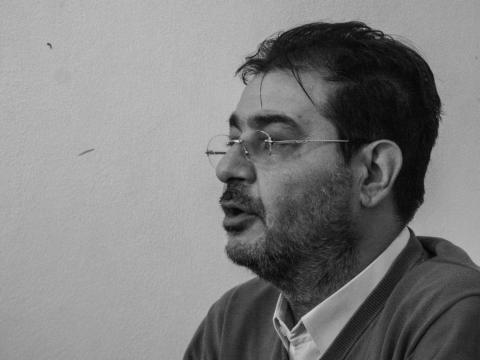في ذروة الاحتجاجات السلمية في سوريا عام 2011، خرج أهالي حي الميدان الدمشقي في مظاهرة تطالب بإسقاط النظام. حينئذ، نُقلت المظاهرة على شاشة قناة الجزيرة، وفي اليوم نفسه خرجت قناة "الإخبارية السورية" (1) الرسمية، لتكشف أن المتجمهرين لم يخرجوا "سوى ليشكروا ربهم على نعمة الأمطار الغزيرة التي هطلت، بينما قناة الجزيرة لا تزال تقول إنها لمظاهرة حاشدة".
رغم أن ذلك المشهد تكرّر لسنوات طويلة، في سياق إنكار الإعلام الرسمي والخاص الذي كان يبث من سوريا لأي أحداث لا تخدم مصالح الأسد، فإنّ هذا المشهد تحديدا يصوّر كمية انصياع وسائل الإعلام لسردية أجهزة المخابرات، حتى لو كان ذلك على حساب الحقيقة والمصلحة العامة، أو على حساب المنطق البشري.
وبعد 14 عاما من استمرار وسائل الإعلام السورية، والرسمية منها على وجه الخصوص بتبني رواية السلطة من دون مناقشتها، يبدو سقوط الأسد، فرصةً أمام الإعلام السوري لمنع تكرار هذه المشاهد على شاشاته أو أوراق صحفه من جديد؛ إذ إن هامش الحرية الذي انتزعه السوريون بعد سقوط الأسد، لا بد أن ينعكس على حالة الإعلام السوري، بوصفه أحد الأوجه الرئيسة لحرية التعبير.
في ذروة الاحتجاجات السلمية في سوريا عام 2011، خرج أهالي حي الميدان الدمشقي في مظاهرة تطالب بإسقاط النظام. حينئذ، نُقلت المظاهرة على شاشة قناة الجزيرة، وفي اليوم نفسه خرجت قناة "الإخبارية السورية" الرسمية، لتكشف أن المتجمهرين لم يخرجوا "سوى ليشكروا ربهم على نعمة الأمطار الغزيرة التي هطلت، بينما قناة الجزيرة لا تزال تقول إنها لمظاهرة حاشدة".
يأتي ذلك وسط معلومات تتسرّب عن إعادة هيكلة لعدد من وسائل الإعلام الرسمية، وعلى رأسها التلفزيون الرسمي، وفي الوقت نفسه بدأت وسائل الإعلام المستقلة نقل مقراتها من خارج سوريا إلى دمشق، كما يحاول" إعلام الثورة" إيجاد موطئ قدم له في المشهد الإعلامي، عبر نقل نطاق تغطيته من إدلب إلى دمشق ومدن سورية أخرى.
ومع الفرصة "التاريخية" لانتزاع أعلى سقف من حرية التعبير، بعد سنوات من القمع الشديد للإعلام من قبل نظام الأسد، حاورت "مجلة الصحافة" الكاتب والصحفي السوري يعرب العيسى، الذي يقسّم المؤسسات الإعلامية السورية حاليا إلى جزأين؛ هما: "إعلام السلطة" الذي انتهى بفرار الأسد إلى موسكو، و"إعلام الثورة" الذي كان يبث من شمال سوريا ودول جوار، وهما "توجهان لا يصلحان لبناء إعلام الدولة".
وفي نظرة تاريخية، يرى العيسى أن "المشكلة الكبرى التي كان يعاني منها الإعلام طيلة فترة حكم الأسدين ليست في الرقابة وتسلط الدولة، بل في أنها كانت صحافة مذعورة، شكّل فيها الرقيب الداخلي أكبر من الخارجي، وكان خوف الصحفي من الجهر برأيه أكبر من سلطة المخابرات، وهكذا تربّت الصحافة السورية على أنها لا تستطيع أن تقول الحقيقة أو جزءا منها". يؤصل العيسى هذه الحالة من الخوف قائلا: "من كان يتجرّأ على قول الحقيقة أو حتى نصفها أو ربعها يتعرّض للتخوين والعنف، والأسباب التي أسست لهذه الحالة تعود إلى عام 1958 عندما أُمِّمت وسائل الإعلام وجُعلت صحافة حكومية، إلى أن جاء عام 2001 وشهد ظهور الصحافة الخاصة للمرة الأولى".
تتكوّن وسائل الإعلام الرسمية من التلفزيون الرسمي السوري ووكالة "سانا" للأنباء وصحيفتين رسميتين، وبينما يجري الحديث عن إعادة هيكلة هذه المؤسسات، يرى العيسى أن سوريا بحاجة على المستوى الوطني إلى شيء جديد تماما؛ ذلك أن المؤسسات الحالية غير قابلة للإصلاح، بسبب حجم الاستهتار والإهمال المهني وهروب الكوادر الجيدة إلى خارج سوريا، وازداد الوضع مأساويةً في سنوات الثورة.
"لنعيد إحياء مؤسسة إعلامية، يجب أن تكون لدينا كوادر جيدة نبني عليها، أو تجهيزات جيدة وحديثة أو بنية مؤسسية جيدة، وهذه العناصر غير موجودة" هكذا يرى العيسى الوضعية الحالية الموسومة بغلبة صحافة الرأي على صحافة الحقيقة.
تقوم المؤسّسات الإعلامية السورية اليوم، على "إعلام الثورة" الذي يحمل كل مواصفات الثورة، وإعلام السلطة الذي يحمل كل مواصفات السلطة، ويبدو أن أي محاولة للدمج، أو التقاطع أو الاختيار أو التركيب بين هذين الإعلامين سيؤدّي إلى الحصول على وجبة لا يقدر لها النجاح وكسب الثقة، حسب العيسى.

وخلال سنوات الثورة والنزاع العسكري مع الأسد قبل سقوطه، لم يكن الصحفيون العاملون في الإعلام الرسمي وشبه الرسمي في دمشق قادرين على أي مقاومة أو مناورة للرواية الرسمية الأسدية، إلى درجة أن صحفيين عملوا في صحف سورية، أكّدوا أن الأخبار السياسية والعسكرية الحساسة كانت تُرسل إليهم من أجهزة المخابرات لنشرها كما هي، وبقيت هوامش هذا الإعلام منحصرة في نقاشات خدماتية واجتماعية ومعيشية لا تُحدث أي تأثير على السلطة أو المجتمع. بالمقابل، فإن "إعلام الثورة" في الشمال السوري، كان يحظى بهامش حرّية أعلى، غير أنه كان يعمل مستنفرا في ظروف ثورية بحتة.
على هذا الأساس، يعتقد العيسى أن النموذج الأفضل يتمثّل في خلق إعلام جديد ومختلف كليا، "وهذا يقودنا إلى سؤال: لماذا يجب أن يكون هناك إعلام رسمي؟ إذ إنّ ثمة دولا إعلامها متطوّر من دون أن يكون لديها إعلام رسمي باستثناء وكالة الأنباء مثل الولايات المتحدة الأمريكية مثلا.
ليلة هروب الأسد، توقّفت وسائل الإعلام المتلفزة جميعها، الرسمية والخاصة، عن البث، ولم تعد حتى الآن، بينما يصرح المسؤولون عن التلفزيون، أنهم يستعدون لاستئناف البث قريبا بانطلاقة جديدة شكلا ومضمونا تواكب انتصار الثورة السورية.
هذه الانطلاقة الجديدة -إن حدثت- فإنها يجب أن تؤدي دورا في "تعريف السوريين ببعضهم وإبراز تنوعهم، بغض النظر على مناطقهم وقومياتهم وطبقاتهم"، وفق ما يشرح العيسى.
خلال سنوات الثورة، قُسّمت سوريا إلى ثلاث مناطق، ولم يكن هناك أي نوع من التواصل المباشر بين سكّان هذه المناطق، وكانت كل منطقة تسيطر عليها جهة عسكرية مختلفة، وبسبب الخطاب الذي كان يضخّه النظام السوري، تفشى التخويف وخطاب الكراهية، لذلك بيرز العيسى: "أنت عدو ما تجهل، وعندما يتعرّف السوريون إلى بعضهم ستكون هناك فرصة أكبر للتقرب ونبذ خطاب العنف".
تقوم المؤسّسات الإعلامية السورية اليوم، على "إعلام الثورة" الذي يحمل كل مواصفات الثورة، وإعلام السلطة الذي يحمل كل مواصفات السلطة، ويبدو أن أي محاولة للدمج، أو التقاطع أو الاختيار أو التركيب بين هذين الإعلامين سيؤدّي إلى الحصول على وصفة لا يقدر لها النجاح وكسب الثقة
بعد تنصيب أحمد الشرع رئيسا للجمهورية العربية السورية في الفترة الانتقالية، حُل مجلس الشعب وألغي العمل بالدستور السابق؛ إذ ستقبل البلاد على صياغة ترسانة كبيرة من التشريعات الجديدة، ومن ضمنها التشريعات الصحفية والإعلامية.
ولكن العيسى يرى أن فكرة إصدار التشريعات والقوانين الخاصة بالإعلام، يمكن استبدالها بالقوانين الجزائية والجنائية العامة، التي يمكن من خلال مكافحة القدح والتشهير والتحريض على العنف وغيرها، وهذه القوانين العامة تستطيع أن تنظّم الإعلام. "وقد يكون لمواثيق الشرف الإعلامي التي جهزت في أثناء سنوات الثورة دور مهم بوصفها تشريعات إعلامية أخلاقية، ولعل من أبرز هذه المواثيق ميثاق شرف ومدونة سلوك يمكن أن تسهم في الفترة الانتقالية في نبذ العنف والكراهية والتحريض على الانتقام في المرحلة الانتقالية.
"سوريا بلد متنوّع من أقصى اليمين إلى أقصى اليسار"، يقول العيسى. وفي اعتقاده، فإن "الفترات السيئة من تاريخ البلاد، التي لم يُعترَف فيها بهذا التنوّع منذ أن وصل حزب البعث إلى السلطة عام 1963 وحاول جعل البلاد تعزف على نغمة واحدة، قد مضت". ومن ثَمّ، تقع على الإعلام المسؤولية الاجتماعية في "أنسنة الآخر" عبر منح الناس فرصة لتعبّر عن نفسها، كذلك على الإعلام أن يرفع سقف الحريات في المرحلة القادمة.
وخلال سنوات حكمه التي زادت على 50 عاما، كان النظام السابق يحكم البلاد بأدوات "قذرة" حسب وصف العيسى، يأتي على رأسها تخويف الناس من بعضهم ووصمهم بــ"الوحوش"، وكانت ثمة مجموعات بشرية كاملة أقنعها النظام السوري بأن طرفا آخر يريد ذبحها، وقد لعب اللعبة نفسها مع أطياف السوريين كافة.
"عندما ينجح الإعلام في أنسنة السوريين، ويصبح الآخر بالنسبة لك إنسانا، فسوف يكف عن معاداتك أو السعي لقتلك، ويدبر الاختلاف في الفضاء العام، وخصوصا في وسائل الإعلام، بدل استخدام الرصاص والاعتقال والتمثيل بالجثث".. هكذا يتمثل العيسى دور الإعلام في المرحلة المقبلة

















![Palestinian journalists attempt to connect to the internet using their phones in Rafah on the southern Gaza Strip. [Said Khatib/AFP]](/sites/default/files/ajr/2025/34962UB-highres-1705225575%20Large.jpeg)





















